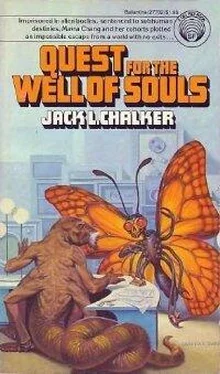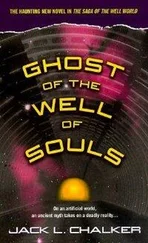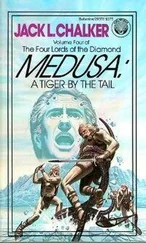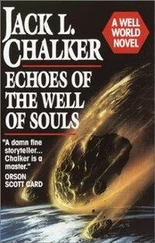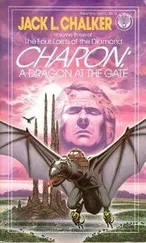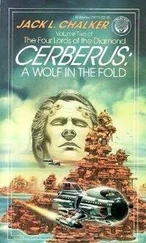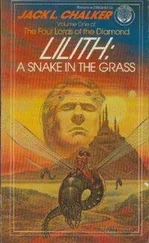Jack Chalker - Quest for the Well of Souls
Здесь есть возможность читать онлайн «Jack Chalker - Quest for the Well of Souls» весь текст электронной книги совершенно бесплатно (целиком полную версию без сокращений). В некоторых случаях можно слушать аудио, скачать через торрент в формате fb2 и присутствует краткое содержание. Год выпуска: 1978, ISBN: 1978, Издательство: Del Rey, Жанр: Фантастика и фэнтези, на английском языке. Описание произведения, (предисловие) а так же отзывы посетителей доступны на портале библиотеки ЛибКат.
- Название:Quest for the Well of Souls
- Автор:
- Издательство:Del Rey
- Жанр:
- Год:1978
- ISBN:0-345-27702-3
- Рейтинг книги:5 / 5. Голосов: 1
-
Избранное:Добавить в избранное
- Отзывы:
-
Ваша оценка:
- 100
- 1
- 2
- 3
- 4
- 5
Quest for the Well of Souls: краткое содержание, описание и аннотация
Предлагаем к чтению аннотацию, описание, краткое содержание или предисловие (зависит от того, что написал сам автор книги «Quest for the Well of Souls»). Если вы не нашли необходимую информацию о книге — напишите в комментариях, мы постараемся отыскать её.
Quest for the Well of Souls — читать онлайн бесплатно полную книгу (весь текст) целиком
Ниже представлен текст книги, разбитый по страницам. Система сохранения места последней прочитанной страницы, позволяет с удобством читать онлайн бесплатно книгу «Quest for the Well of Souls», без необходимости каждый раз заново искать на чём Вы остановились. Поставьте закладку, и сможете в любой момент перейти на страницу, на которой закончили чтение.
Интервал:
Закладка:
The two lay down in the tall grass and waited several minutes before they saw the cause: five Ecundans, each standing on six two-meter-long crab-like legs, were coming down with amazing speed after the fleeing bundas. Their beady stalked eyes looked ahead—long tail-sections raised and nasty stingers dripping venom, the two claws raised at the ready before them.
The Ecundans intersected the herd near Mavra and Joshi. The two pressed into the ground and held their breaths as one passed almost over them, its eyes following the game ahead. It smelled lousy.
The Ecundans fanned out, driving the herd first one way, then the other, and, finally, almost in circles. Having tired the beasts, they closed in, claws grabbing, stingers flashing with incredible speed.
But those stung initially were just to help as barricades, to limit the frantic animals to a single avenue of escape, which was, in turn, covered by other Ecundans with great nets. The herd ran right into them, and even as the leaders stumbled and fell squealing into the trap, the others mindlessly followed, until the controlling Ecundans considered the haul sufficient and drew the net tight. Two nets held at least twenty bundas apiece, and the great scorpions carried the heavy load as if it were nothing.
Satisfied, the Ecundans let the rest of the herd pass, and all hands fell upon the paralyzed bundas that had formed the living corral, cutting with sharp claw-teeth and eating them, bones and all, in large gulps through mouths that opened wide in four directions. The Changs could see no chewing motions; either the Ecundans digested the chunks whole or their teeth were far back beyond the thorax.
“Oh, boy,” Joshi breathed unenthusiastically as the Ecundans rumbled off with the day’s catch. “I’d rather talk to them than have to argue with them.”
“Wouldn’t do much good,” Mavra responded glumly. “Those hard cases on the ship said that Ecundans are very nasty about strangers they don’t invite. They eat them or just paralyze them and send them home by ship as object lessons. No, we’ll not get any help from the Ecundans, believe me.”
On the ninth day their food supplies were running low. It concerned them both.
“How much farther to this Wuckl border or whatever?”
“Shouldn’t be far,” Mavra replied. “We’ve been making damned good time.” Particularly since seeing that Ecundan roundup, she added silently.
And they had made good time. The interior valley was mostly flat, there were few obstructions, bunda trails were everywhere, and they had had the sun at some point every day to keep their bearings. The flat land and trail had allowed them to trot; they were making forty to fifty kilometers a day, by Mavra’s figuring. If they’d been keeping to the correct direction, the border should be close by. She told Joshi so.
“It better be,” he replied. “Damn! What do they eat in Wuckl, anyway?”
“Pretty much what we do,” she replied. “A lot less meat, though. They are a really funny people, as I recall. You’ll have to see one to believe it—I won’t even try to describe it. Mostly vegetarians by choice, they do some fresh-water fishing in interior lakes. They’re high-tech, but slow breeders with a small population. And if the Trader’s information is accurate, they have a lot of parks and game preserves just for enjoyment.”
He nodded. “But won’t it be risky asking for food?” he wondered. “After all, a high-tech hex. The people who want us are bound to look there, too.”
“We won’t ask unless we have to,” she told him. “There’s a lot of wild fruit and vegetable stuff growing in those parks and lake areas, and I don’t think we’ll have to hustle long.”
She was right. They made the border near dusk.
It was a forest, but not a dense one, just a parklike wood, complete with pebble-filled trails. The place was beautiful—they could see wild berry bushes and even several citrus trees bursting with fruit. It looked like the land of milk and honey, and the Wuckl were neither antisocial nor deadly.
But there was a hitch.
“Look at that,” Joshi grumped. Four strands of coppery barbed wire about two meters high, the fence was attached to metal poles every four meters or so as far as the eye could see.
“To keep the Ecundans out?” Joshi wondered.
She shook her head. “To discourage a bunda invasion of the Wuckl parks and an attack on their goodies, I’d say. Probably put up by both countries in their mutual interest.”
“That top line of barbs looks kind of nasty. How are we gonna get over it?”
“We’re not,” replied Mavra Chang. “We’re going under it. There’s a good fifty centimeters clearance, and I think I can stand a barb or so to get through. Game?”
Joshi looked at the little barbs, which didn’t seem all that sharp, then thought about the Ecundans chopping up bundas. “Who’s first?” he asked.
“I’ll go. With any luck I might just wriggle right under it. Then I can help you through.”
He nodded and she approached the fence. “Funny,” she said thoughtfully. “A little humming sound. Vibration?”
He heard it but shrugged. “Who knows?”
“Here I go!” she announced, and crouched down as low as she could. The exercise was painful, and she started regretting that extra fat she’d laid on over the years.
She still made it about halfway under when her hips touched the bottom wire.
She screamed and Joshi heard a loud buzz as activators were tripped; she yelled and jerked spasmodically.
“Mavra!” Joshi cried in panic as he rushed to her aid. As soon as he grabbed at her twitching hind leg with his mouth he felt the shock, too.
Ecundo was a semitech hex, but, unfortunately, Wuckl was a high-tech hex, and the fence was one meter inside Wuckl.
And it was electrified.
Hookl
The skies had cleared, the weather was warming, and all was right with the world for the crew of the Toorine Trader. Seas were under two meters, and she was under a full head of steam heading north-northwest, great clouds of gray-white steam leaving a kilometer-long double line from her twin stacks. They had lost some time in Nocha’s storms; now they were making it up.
On the back hatch, two pinkish Twosh were relaxing, enjoying the feel of sun on their bowling-pin shapes. With ten cigars in little holsters on its belt, one Twosh was balancing itself well on one broad hand while its other hand removed a cigar and stuck it in a tiny, almost circular mouth. It never lit one; it just kept sucking and nibbling on the cigar until it had ingested the whole thing.
“Big thing, in flight twenty degrees off the starboard bow!” the lookout suddenly shouted from the radar console.
The Twosh with the cigar looked up and located a faint, faraway shape, then turned big lemon eyes to its twin. “Not another one!” it groaned.
The other Twosh strained. “I’ll be damned if it don’t look like a horse this time. That’s all we need. A stampede on the high seas!”
“And you know who’ll have to clean up the deck,” the first one added ominously.
The great deep-purple horse, swan’s wings spread wide to take advantage of the updrafts, circled the ship several times as if making certain that it was the one sought and, if so, allowing its rider to figure out how to land. It was a tricky problem. An Agitar pegasus didn’t just land like a bird; it had to have a little room to run on the ground, to break its momentum. It could land in water, of course, but while the sea was calm enough for the Trader, it was pretty rough for anything smaller.
The captain and crew stared at the newcomer, wondering what he was going to do.
Читать дальшеИнтервал:
Закладка:
Похожие книги на «Quest for the Well of Souls»
Представляем Вашему вниманию похожие книги на «Quest for the Well of Souls» списком для выбора. Мы отобрали схожую по названию и смыслу литературу в надежде предоставить читателям больше вариантов отыскать новые, интересные, ещё непрочитанные произведения.
Обсуждение, отзывы о книге «Quest for the Well of Souls» и просто собственные мнения читателей. Оставьте ваши комментарии, напишите, что Вы думаете о произведении, его смысле или главных героях. Укажите что конкретно понравилось, а что нет, и почему Вы так считаете.
